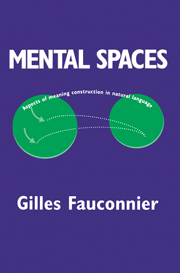Book contents
- Frontmatter
- Contents
- Foreword
- Preface
- Acknowledgments
- Introductory Note
- 1 Pragmatic Functions and Images
- 2 Roles and Multiple Connectors
- 3 Presuppositions: Floating, Transfer, and Projection Strategies
- 4 Counterfactuals and Comparatives
- Chapter 5 Transspatial Operators, Philosophical Issues, and Future Perspectives
- Notes
- References
- Index
1 - Pragmatic Functions and Images
Published online by Cambridge University Press: 20 January 2010
- Frontmatter
- Contents
- Foreword
- Preface
- Acknowledgments
- Introductory Note
- 1 Pragmatic Functions and Images
- 2 Roles and Multiple Connectors
- 3 Presuppositions: Floating, Transfer, and Projection Strategies
- 4 Counterfactuals and Comparatives
- Chapter 5 Transspatial Operators, Philosophical Issues, and Future Perspectives
- Notes
- References
- Index
Summary
Connectors
In the quest for a fully explicit and maximally integrated account of language organization, much attention has been focused on the multilevel structural intricacies of linguistic forms. Recently, however, some studies have shifted this focus of attention from the language forms themselves to other structures and networks on which they depend and to the correspondences that hold, or are established, between such structures and networks. Outstanding examples are the notions of frames and scenarios; literal metaphor as an elaborate structuring of conceptual networks via partial correspondences underlying semanticpragmatic organization and its expression through language; the account of presupposition in terms of discourse worlds linked to each other; and the treatment of “scopal” phenomena like opacity and transparency as referential correspondence between concrete or mental images.
In his excellent study of reference, G. Nunberg provides a key idea related to such correspondences: the notion of pragmatic function. He shows that we establish links between objects of a different nature for psychological, cultural, or locally pragmatic reasons and that the links thus established allow reference to one object in terms of another appropriately linked to it.
Information
- Type
- Chapter
- Information
- Mental SpacesAspects of Meaning Construction in Natural Language, pp. 3 - 34Publisher: Cambridge University PressPrint publication year: 1994
